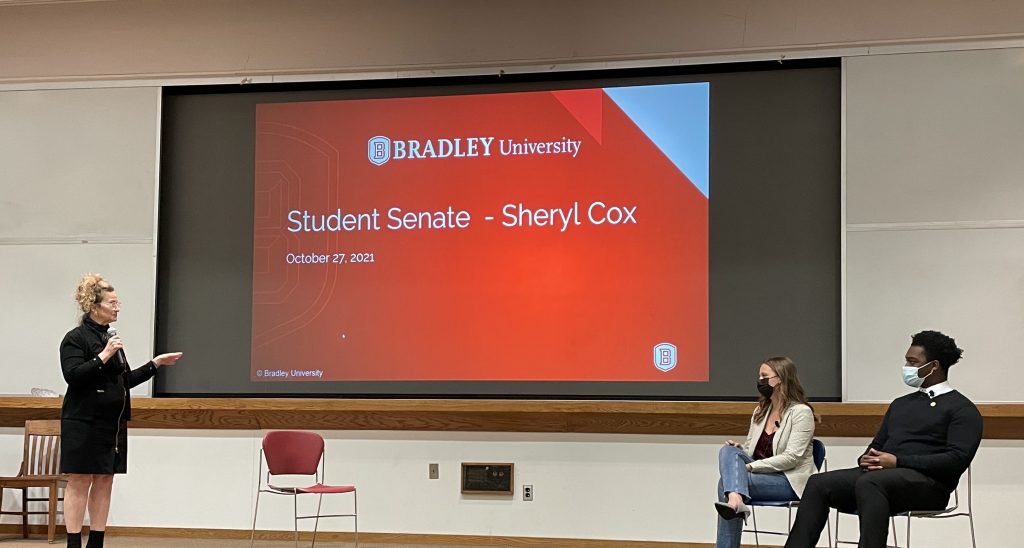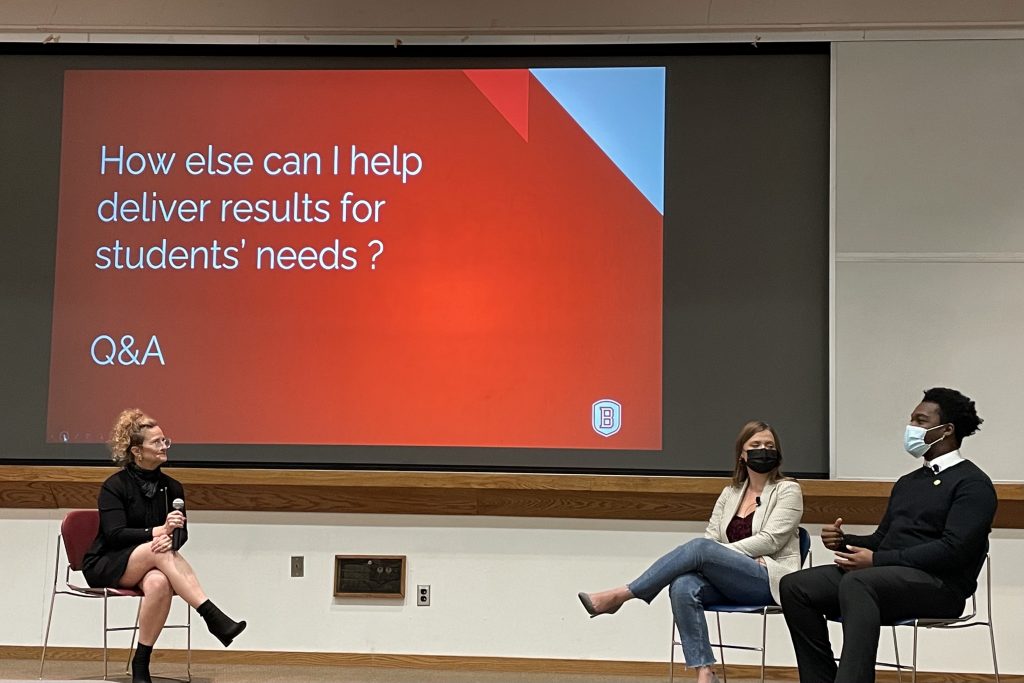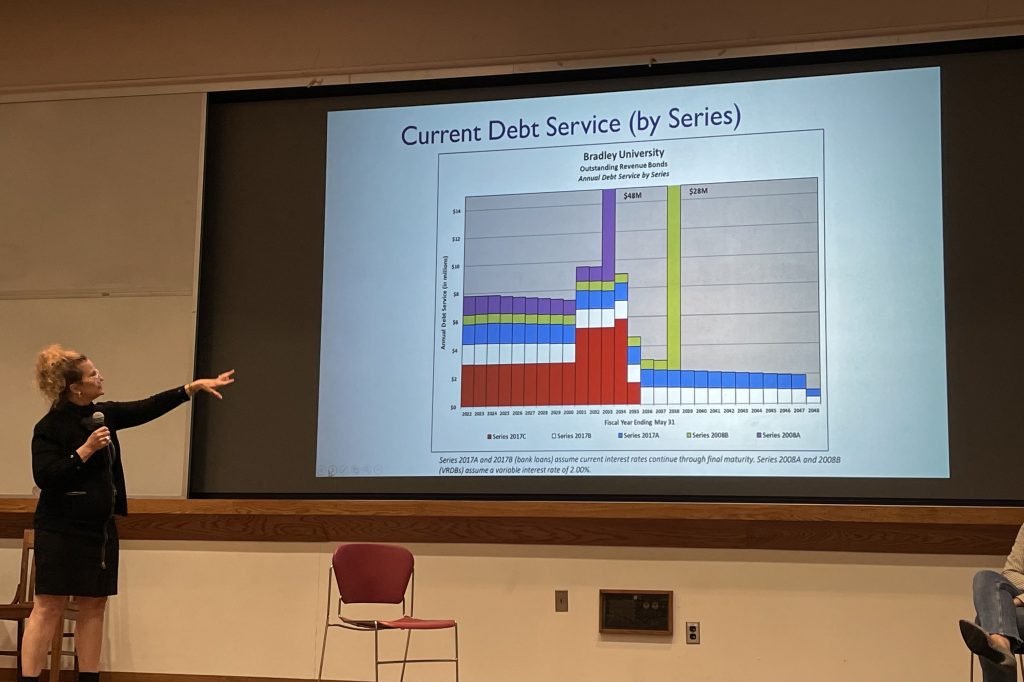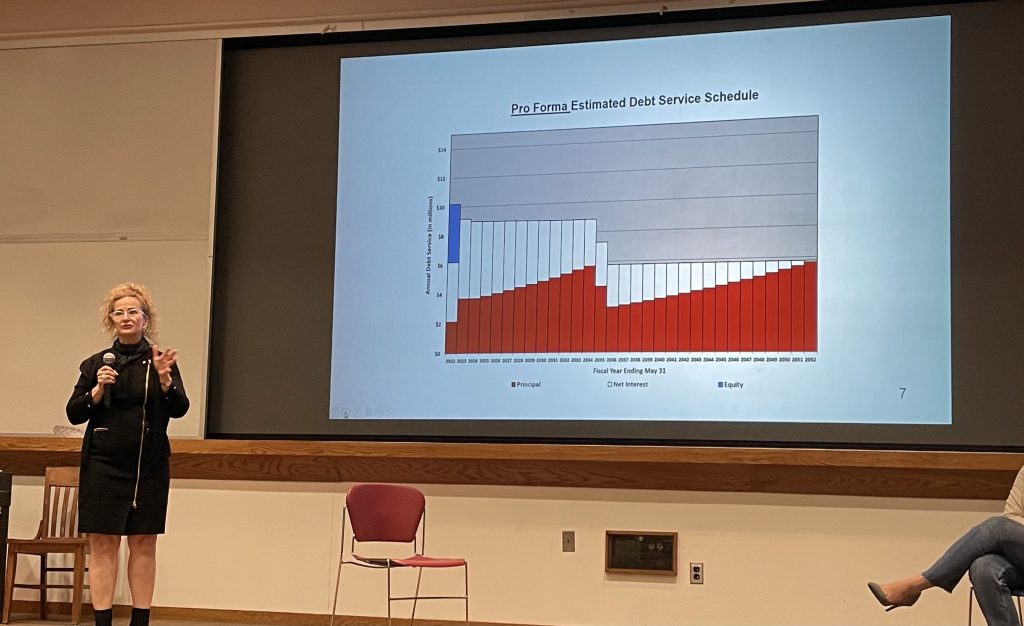
This past Wednesday in Neumiller Hall, the Bradley Student Senate welcomed Sheryl Cox, the university’s newest Chief Financial Officer, to a forum. There, students could learn about the responsibilities of a top administrative position as well as ask questions.
Emma Hoyhtya, speaker of assembly, and Amir Sykes, first-year senator, joined Cox on the hall stage as the facilitators of the conversation.
Cox opened the event with a presentation, a section of which was dedicated to explaining Bradley’s strategies regarding debt. She stated that Bradley has over $100 million in debt, and further claimed that based on her experience upon arriving at the university, Bradley did not use a proper debt strategy.
The university had a lot of risk in its debt from the $48 million of bank debt it had at the time, on which it built much of its capital structure and its use of bullet payments (which she said investors do not favor) and variable-rate bonds.
“[The use of variable-rate bonds] is fine in these times right now where interest rates are low,” Cox said. “But…in two years when those interest rates pop up, my interest rate is gonna go up, and my budget may or may not be able to accommodate those interest rates.”
Cox stated that Bradley has since adopted a formal debt structure with her assistance, describing incentive-based budgeting as a main current initiative for the university. She showed several slides detailing Bradley’s current debt services, which contained bar graphs illustrating a significant prospective decrease in the university’s debt service from 2022 to the 2040s and 2050s, alongside an eventual waning of net interest in favor of principal.
The presentation also included the floor being opened for a Q&A, which saw both Hoyhtya and Sykes alongside other Bradley senators asking questions they had received from students.
Sykes asked Cox how students can manage personal finances, to which she advised making a strategy to pay off whatever debt one takes out. Upon Sykes also asking about a normal debt amount for a recent Bradley graduate, she roughly estimated between $60,000 and $100,000.
Hoyhtya prompted Cox to rationalize current students becoming donating alumni by breaking down how much of her budget is covered by tuition and donations. She answered that while Bradley’s donations are less than its competitors, she stated that students generated close to 80% of revenue.
“That’s how important you guys are,” Cox said. “We cannot run this institution without the students.”
When student body president Erin Bousek asked about how Cox would compare and contrast the number-based side and the management-based side of her jobs, she shared that they synthesized easily, with examples including knowing the number of admissions counselors per student or cleaning people per square foot.
“Good leadership knows their numbers,” Cox said. “If you don’t know your numbers, you’re not the best, because someone’s better out there.”
Branden Magdaleno, chairperson of diversity and inclusion, asked Cox about plans to improve student housing, referencing mishaps he encountered living in Wyckoff Hall, which he stated was considered the worst housing option by students. Cox responded that while most of the administration’s work in relation to the question is confidential, the administration is aware of the situation and trying to find solutions.

Cox, who also serves as the university’s senior vice president and Chief Operating Officer, also walked the attendees through her background and current job responsibilities.
Cox stepped into her first CFO position as a divisional CFO for a McDonald’s in the Chicagoland area. However, a push to “make a more powerful impact” in her work led to her spending 15 years in the world of private equity, a form of investment-based financing.
“[Private equity] just agrees with me knowing that I’m making an immediate impact not only for the investors but for the people who work for me,” Cox said.
Cox explained that she found her way to the Hilltop through being enlisted for consulting work by Bradley’s former CFO, after which she was approached by the university’s then-president to continue her work. Cox stated that she drew similarities between her work at Bradley and her work in private equity, namely in the idea of innovation.
She also spoke fondly of Bradley, both for its pre-existing environment and future plans.
“You guys have picked a wonderful place to be for the next 1-4 years because you’re going to see a lot of change,” Cox said. “I hope at the end of the day, you’re going to be very proud of your university and where we are nationally.”
Cox pointed to sustainability as one area where Bradley can maintain growth, noting that the institution has the funding to accommodate big changes that will build on the institution’s strength and power. She additionally spoke on her hopes of students becoming active alumni, with many current alumni serving as secret donors to the university.
Cox then detailed her responsibilities in her three Bradley positions, listing marketing, financial services, human resources, the police department and dining services among the areas that report to her, totaling over 300 people. When asked by Sykes how she keeps track of the departments, she highlighted regular one-on-one meetings and touching base as helpful practices.
Hoyhtya concluded the event by emphasizing the Student Senate’s ongoing interest in learning about the activity of Cox’s department.
“Even though it might seem like something that is invisible to students’ eyes, those are the kinds of things that’ll really improve morale,” Hoyhtya said. “To know that you put money into that, it means that students will respect that immensely, and you are one of those hidden figures in our administration.”
The event ended with enthusiastic applause from the attendees.
“I’ve definitely learned some really valuable information,” Sykes said. “I’m glad to see that those who we don’t see on a daily basis are working diligently to make sure that our university has a bright future.”



